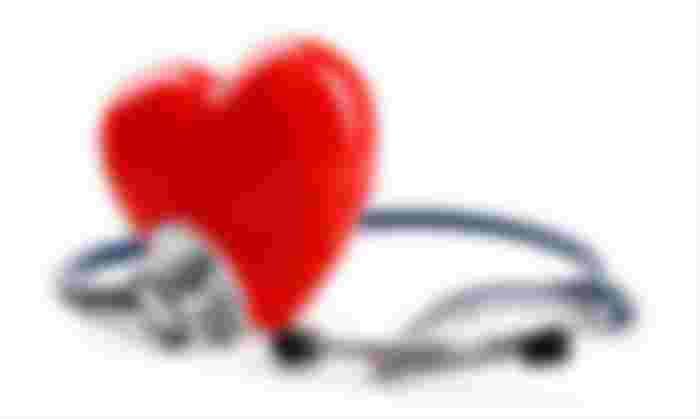
The dilated heart is also known as dilated cardiomyopathy. It is a pathology of the heart that means that it cannot function as it should.
Its causes and symptoms are varied. There are some factors that can influence the development of this pathology and which should be known.
How does the heart work?
First we are going to make clear some important concepts about the healthy heart in order to understand this disease. The heart is divided into four chambers:
Two atria at the top.
Two ventricles at the bottom.
To understand how it works, we separate the heart into the left half and the right half:
Oxygen-free blood from the entire body is received in the right atrium. From here it passes to the right ventricle and this expels it to the lungs. In these organs, the blood removes the carbon dioxide it carries and recharges itself with oxygen.
Oxygenated blood reaches the left atrium directly from the lungs. From there it goes to the left ventricle and this, in each beat, sends this oxygen-laden blood to the rest of the body so that the organs use this oxygen.
In order for the heart to function properly, its walls are made of a muscle known as the myocardium. It has to be in good condition to be able to stretch when receiving the blood and contract with enough force to pump it throughout the body.
What is a dilated heart?
The dilated heart is a pathology in which the muscular walls of the heart become thinner and dilate. It normally begins by affecting the left ventricle, which is the most important chamber for blood supply to the rest of the body.
What happens is that, when the muscle is dilated, the contraction force decreases. As a result, the heart loses strength by pumping blood, and it is expelled weaker from the ventricle. Because of that, you may have trouble reaching the entire body.
What is its cause?
Up to half of the occasions its cause is not known exactly. Despite this, there are different factors that can influence the development of this pathology:
Genetic cause: Up to a quarter of cases of dilated cardiomyopathy there is a family history of this disease. In addition, some of the genetic mutations that cause it are known.
Alcohol abuse: also called enolic cardiomyopathy. Consuming an excessive amount of alcohol over many years causes the heart to dilate.
Pregnancy: during pregnancy, especially in women with other risk factors such as obesity or advanced age, this pathology can develop. Prognosis and recovery will depend on many variables, although it is advised that these women do not have more pregnancies again.
Some viral diseases: Viruses like HIV or coxsackie virus can cause viral cardiomyopathy. Many times it goes unnoticed and ends up causing dilation of the heart.
By drugs or other toxic substances: For example, some chemotherapy treatments for cancer have this side effect that must be well controlled.
What symptoms does the dilated heart produce?
There are many symptoms that can occur. In general, they are symptoms of heart failure. Most often, they gradually develop and get worse. Some of them are the following:
Drowning sensation when breathing: it occurs because, when you cannot pump blood correctly, it accumulates in the anterior part of the cardiovascular circuit, that is, in the lungs. Therefore, the gas exchange in the lungs does not take place correctly and gives this sensation.
Tiredness: it will appear first with more intense efforts and will get worse as the disease progresses until it appears with less intense activities such as climbing stairs or walking. It occurs because the muscles in the body do not receive enough oxygen from the failure to pump.
Palpitations and dizziness: Palpitations are the feeling that the heart is racing in the chest. Both occur because the heart is unable to meet the body's oxygen and energy needs. Therefore, it accelerates and works beyond its possibilities. It may even run out.
Diagnosis and treatment
The diagnosis of the dilated heart will be made by combining the clinic and the physical examination by the doctor, along with some other tests. With them we can see the left ventricle larger than normal and check how the heart works. These tests may be, among others, the following:
Cardiac ultrasound, with or without function tests.
Chest x-ray.
Electrocardiogram.
Once the diagnosis is confirmed, the treatment will be based on different points. On the one hand, we must take into account the cause of cardiomyopathy. For example, if the cause is alcohol, abandoning its consumption can even cause the heart to return to its original shape.
In addition to this, the specialist will prescribe a series of drugs to help the heart pump blood well. In very serious cases, you may need a heart transplant.
You must take care of your heart
The heart is the most important organ for the functioning of our entire organism. Therefore, we must know the signs that something is not going as it should. In these cases, you must go to the specialist, who will diagnose and establish the most appropriate treatment.
Likewise, it is convenient to know the risk factors that can make this pathology appear and control them as much as possible. If you have any questions, the doctor will inform you in detail of what you need.

The article makes points on the meaning, causes, symptoms and treatment of dilated heart disease. People should not joke with the health of their heart.